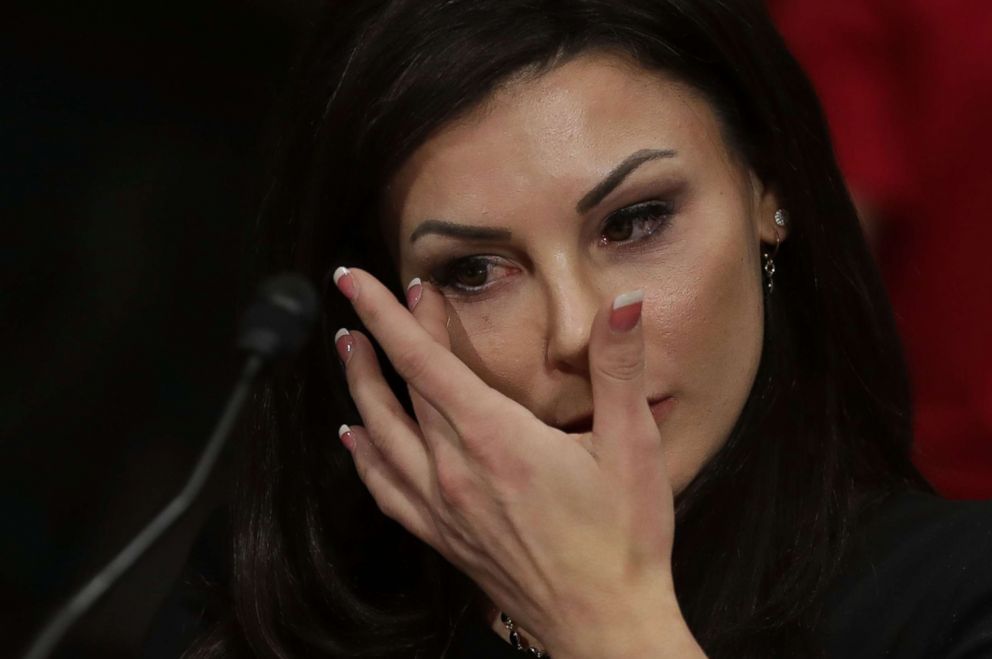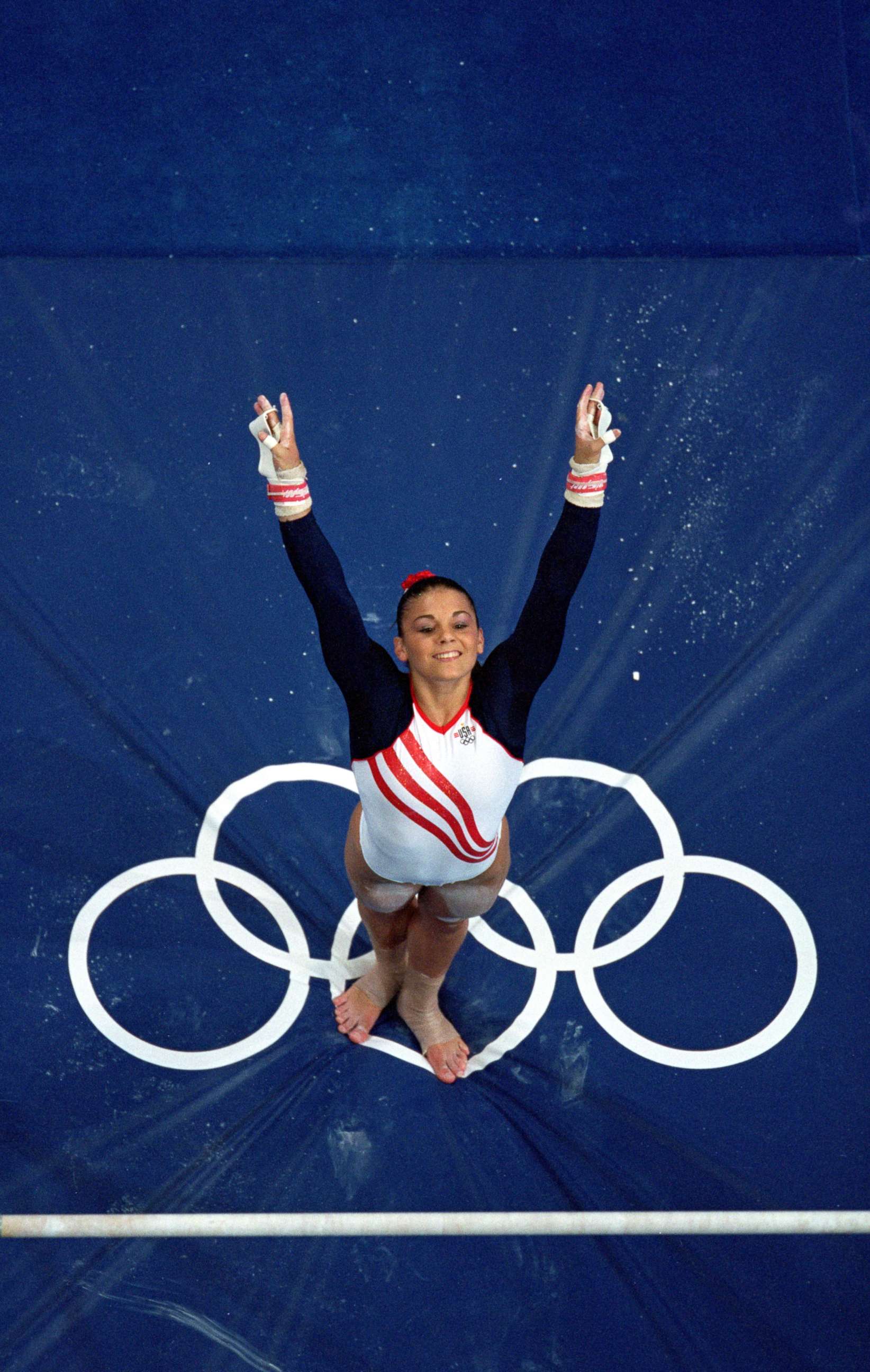Olympic star says her gymnastics dream took nightmarish turn after sexual abuse by Larry Nassar
Olympic medalist Jamie Dantzscher detailed sexual abuse.
— -- As young child, Jamie Dantzscher said she would stand in front of a TV in her family's California home and watch the gymnasts competing at the Olympics, dazzled by the vaults and somersaults and pageantry. Barely young enough to speak, she told her parents, "I want to be in the Olympics."
Some three decades later, Dantzscher says her childhood dreams were realized, but they came with an enormous price. In an interview with ABC's "20/20," the 2000 Olympic bronze medalist says the cult-like training she endured as an elite athlete led her into the trap of a sexual predator, a doctor she once adored -- Larry Nassar.

"I trusted him right away," Dantzscher said of Nassar.
Watch the full story on "20/20" TONIGHT at 10 p.m. ET.
Dantzscher, now 35, was one of 156 women who either spoke in a Michigan court or had their victim impact statements read on their behalf at Nassar's seven-day sentencing hearing that ended Wednesday with the former USA Olympic gymnastics team doctor being sent to prison for up to 175 years on charges stemming his guilty pleas to multiple counts of sexual criminal conduct. The punishment is in addition to the 60 years he received in December after pleading guilty to possession of child pornography.
She and nearly two dozen other women spoke to "20/20" after a state court judge sentenced Nassar on Wednesday. Dantzscher also sued USA Gymnastics and Bela and Marta Karolyi, gymnastics coaches and owners of the Karolyi ranch.
"When I stood there in court and read my statement and got to face him, I was nervous at first," Dantzscher said of her appearance in Ingham County Circuit Court.
But the more she spoke in court, she said the more she noticed the "tone in my voice change" into an empowering unleashing of feelings she had kept to herself for years. While she believes she got her point across at "what he is and hopefully what was going to happen to him," she says she didn't tell Nassar everything.
"They don't like those types in jail," she told 20/20, referring to convicted sexual abusers, "and I just hope there's guys in there that perform the same medical treatments on him and I hope they do that 'til the day he dies. I hope he doesn't die for a long time. That's really how I feel about that 'cause I think somebody like that has no feeling, has no ability to empathize, that's the only way they're gonna suffer."

But Dantzscher says she didn't always feel disgust and anger for Nassar. While training to make the 2000 Olympic team she said she was to believe Nassar was like her guardian angel.
In her statement she read in court at Nassar's sentencing hearing, "Dr. Nassar was nice, sympathetic, and provided a sharp contrast to the overtly abusive environment overseen by USA Gymnastics and others, and I trusted him."
"They controlled what we ate," she told "20/20." "They controlled how we stood, how they wanted our hair, how we should talk, when we could talk. There were times we got in trouble for just smiling."
She added: "That's not even including the injuries that we had to work through. Like, I competed on a fractured back. I have a toe that's healed broken because I never took the time to just let it heal. I've competed on a sprained ankle. I mean, I don't even know how I did it. When I think about it now, I don't know how any of us did, but it was like that's all we knew. That was the only system given to us, you know? We had no other option if we wanted to have our dream come true as a young girl to be on a world championship team or be on an Olympic team."
She said Nassar, 54, was initially the opposite of her coaches.
"I was scared to do the wrong thing, say the wrong thing, stand the wrong way, not make my routines," she said. "I was scared to be injured. A lot of the times I wasn't even believed with my injuries. So, going to Dr. Nassar was like a bright light."
She went on, "Larry was my buddy. Larry would make me laugh. Larry would say, 'Oh, they're all horrible. I get it.' It's hard for me to say now, but I looked forward to treatment because at least I was allowed to laugh and have a little bit of some downtime, I guess of not feeling so intense all the time. As a child in that environment, Larry was the only adult that I can remember that I trusted right away. I thought he was there to help me, and not only that, I actually thought he might be the only adult around me that actually cared about my health and well-being."
She said she trusted Nassar so much that she didn't think his treatments, which she said included touching her with ungloved hands in the most intimate places of her body, were anything other than normal medical procedures.
She said it wasn't until years later that she discovered what Nassar did to her was deviant. While coaching at a gymnastics camp in Northern California, a friend confided to her that she had been sexually abused by a coach.
"I was speaking with another coach who was hired for that camp, and the issue of sexual abuse came up," Dantzscher said. "Some of the things that happened to my friend, and saying it out loud, it kind of clicked like ... (that) sounds awfully familiar of some of the things that Larry Nassar did to me. That's when I was like, 'Wow, this might be wrong.'"
She said she decided to come forward and report Nassar and speak about her abuse to investigative reporters at the Indianapolis Star newspaper in 2016 because she didn't want the same thing to happen to her nieces.
"When I picture it happening to one of my nieces, that's when I was like, 'I need to do the right thing because I would want to kill the man that did that, that hurt one of my nieces, or one of the little girls I coach,'" she said. "That's really why I came forward. My main concern -- and still is -- is to protect other young athletes from these predators. And it's way more than Larry Nassar. I can tell you that."


